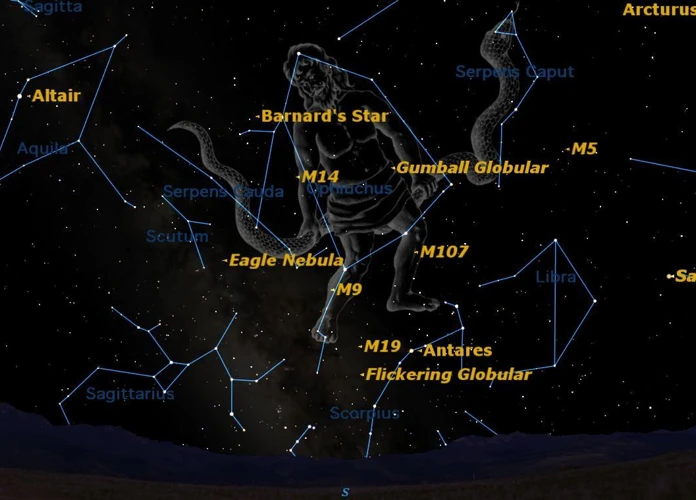Have you ever heard of Ophiuchus? Prepare to be captivated as we unveil the secrets of this enigmatic constellation, closely examining its mythology, astrology, historical significance, and more. Ophiuchus, also known as the Serpent Bearer, has a rich and fascinating background that stretches back in time. From its ancient Greek connection to the tales and symbols associated with it, Ophiuchus has captured the imagination of people across cultures. We will also explore its position as a lost and rediscovered constellation and delve into the scientific and astronomical insights it offers. Join us on this journey of discovery as we unlock the mysteries surrounding Ophiuchus and delve into its intriguing world.
Contents
- Origin and Background
- Significance in Astrology
- Mythological Tales and Legends
- Lost and Rediscovered Constellation
- Scientific and Astronomical Insights
- Modern Pop Culture Representation
- Controversies and Debate
- Ophiuchus in Other Cultures
- Conclusion
-
Frequently Asked Questions
- What does Ophiuchus represent in astrology?
- What are the astrological traits and characteristics of Ophiuchus?
- How does Ophiuchus compatibility work with other zodiac signs?
- Are there any famous celebrities who fall under the Ophiuchus sign?
- What are some mythological tales and legends associated with Ophiuchus?
- What are the key symbols associated with Ophiuchus?
- Why was Ophiuchus considered a lost and rediscovered constellation?
- Are there any scientific insights or discoveries related to Ophiuchus?
- How is Ophiuchus portrayed in modern pop culture?
- What are the controversies and debates surrounding Ophiuchus?
- References
-
Frequently Asked Questions
- 1. Is Ophiuchus considered an official zodiac sign?
- 2. What are the astrological traits of Ophiuchus?
- 3. How does Ophiuchus affect compatibility with other zodiac signs?
- 4. What is the mythological connection of Ophiuchus?
- 5. What are some notable stories and symbols associated with Ophiuchus?
- 6. Can you explain the lost and rediscovered constellation of Ophiuchus?
- 7. What do scientific and astronomical insights reveal about Ophiuchus?
- 8. How is Ophiuchus represented in modern pop culture?
- 9. What are the controversies and debates surrounding Ophiuchus?
- 10. How does Ophiuchus appear in other cultures?
- References
- Read More
Origin and Background
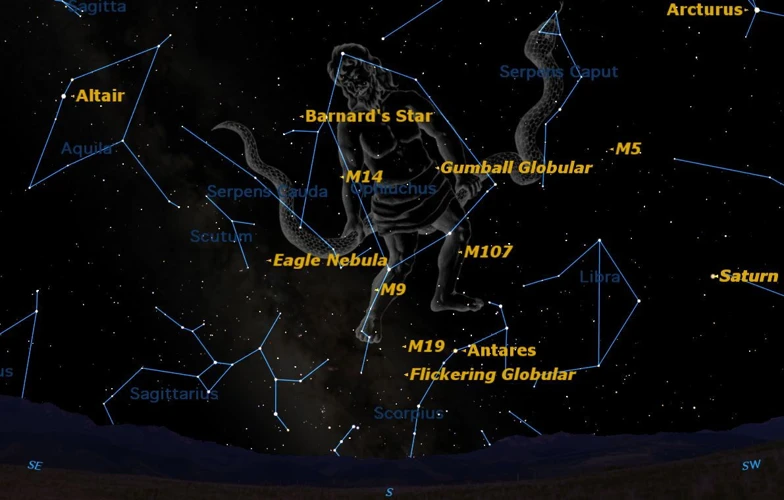
Ophiuchus has an intriguing and ancient origin that can be traced back to various civilizations throughout history. The constellation is often associated with the Greek myth of Asclepius, the son of Apollo and the god of medicine and healing. Legend has it that Asclepius possessed incredible healing powers and could even bring the dead back to life. This extraordinary ability ultimately led to his downfall, as it disrupted the balance between life and death, angering the gods. As a punishment, Zeus struck Asclepius with a thunderbolt, killing him instantly. However, recognizing his valuable contributions to humanity, Zeus immortalized Asclepius in the form of the Ophiuchus constellation. In other cultures, such as ancient Egyptian and Babylonian, similar figures and stories are associated with the constellation. This rich background adds layers of mystery and intrigue to Ophiuchus, making it a captivating subject of exploration and study.
Significance in Astrology

In astrology, Ophiuchus holds a unique and significant position, despite its exclusion from the traditional zodiac signs. Those born under this mysterious constellation are believed to possess a blend of traits and characteristics that set them apart from others. Ophiuchus individuals are often seen as seekers of knowledge and truth, with a deep passion for wisdom and spirituality. They are known for their strong intuition and healing abilities, making them natural counselors and guides. While Ophiuchus may not fit neatly into the traditional astrological system, its inclusion adds a new dimension to the interpretation of celestial influences. To explore the compatibility of Ophiuchus with other zodiac signs, check out our article on Ophiuchus compatibility.
Astrological Traits and Characteristics of Ophiuchus
When it comes to the astrological traits and characteristics of Ophiuchus, this enigmatic constellation brings a unique energy to the zodiac spectrum. People born under the sign of Ophiuchus, which falls between November 29th and December 17th, possess a multitude of intriguing qualities. They are known for their wisdom, intuition, and a deep connection to spirituality. Ophiuchus individuals are often natural healers and are drawn to the field of medicine or alternative healing practices. They have a magnetic personality and possess strong leadership qualities. The Serpent Bearer is associated with transformation and rebirth, symbolizing the shedding of old layers and embracing personal growth. Ophiuchus individuals are passionate seekers of knowledge and have a thirst for uncovering hidden truths. Their spiritual journey is marked by a desire for self-discovery and a connection with the divine. While Ophiuchus is not officially recognized as a zodiac sign in mainstream astrology, those who resonate with its energy find solace in their unique place in the celestial tapestry. Want to explore the spiritual journeys of Ophiuchus individuals? Check out our article on /spiritual-journey-ophiuchus-celebrities/ to discover famous personalities who embody the essence of Ophiuchus. Stay tuned for more insights into the intriguing world of astrology and Ophiuchus.
Ophiuchus Compatibility with Other Zodiac Signs
When it comes to compatibility with other zodiac signs, Ophiuchus brings a unique and intriguing dynamic to the astrological realm. As the Serpent Bearer, Ophiuchus possesses traits and characteristics that can interact in fascinating ways with other signs. Ophiuchus individuals are known for their intense passion, wisdom, and desire for knowledge. They have a natural ability to heal and bring balance to the lives of those around them. This makes them compatible with signs that appreciate their nurturing and caring nature. Ophiuchus finds a strong bond with the Sagittarius, as both signs share a love for adventure, exploration, and the pursuit of truth. Their combined energy creates a dynamic partnership filled with intellectual stimulation and growth. Additionally, Ophiuchus finds compatibility with Aquarius, as both signs value individuality, independence, and intellectual pursuits. Their shared desire for personal freedom and progressive thinking creates a harmonious relationship. However, it’s important to note that compatibility extends beyond just sun sign pairings. The entire birth chart should be considered for a comprehensive understanding of astrological compatibility. So, while Ophiuchus may find compatibility with certain signs, individual variations within each sign can also play a significant role in determining a successful partnership. To explore Ophiuchus compatibility further, check out our guide on healthy eating tips for Ophiuchus individuals.
Mythological Tales and Legends
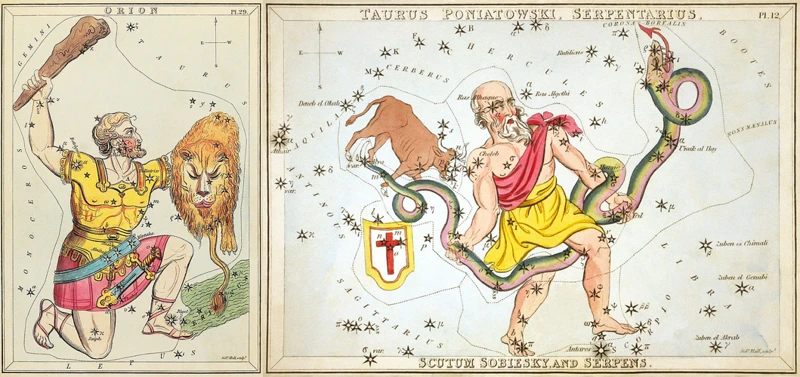
Mythological tales and legends surround Ophiuchus, adding depth to its mystical allure. In ancient Greek mythology, Ophiuchus is often associated with Asclepius, the god of healing. The story goes that Asclepius possessed such extraordinary healing powers that he could even resurrect the dead. This incredible ability was seen as a threat by the gods who believed it disrupted the natural order of life and death. As a result, Zeus struck Asclepius with a thunderbolt, killing him, but later placed him in the stars as the constellation Ophiuchus. In Egyptian mythology, Ophiuchus is associated with Imhotep, a legendary physician and architect who later became deified as a god of medicine. These tales and legends not only make Ophiuchus a fascinating subject of exploration but also highlight the universal human fascination with healing, transformation, and connection to the celestial realm.
The Ancient Greek Connection
The Ancient Greek connection to Ophiuchus runs deep, as it is intertwined with the mythological stories of Asclepius, the Greek god of healing. Asclepius was revered for his remarkable ability to heal the sick and even resurrect the dead. In Greek mythology, it is believed that Asclepius learned the art of medicine from the wise centaur Chiron. This knowledge allowed him to become a skilled healer, earning high praise from mortals and envy from the gods. The constellation Ophiuchus represents Asclepius himself, depicted as a figure holding a serpent. This serpent is often associated with rebirth and regeneration, symbolizing the healing powers that Asclepius possessed. The Greeks greatly revered Asclepius, and many temples and healing centers were dedicated to him, notably the renowned sanctuary of Asclepius at Epidaurus. The ancient Greeks strongly connected Ophiuchus with healing and medicine, recognizing its influence as a celestial representation of the benevolent god Asclepius.
Stories and Symbols Associated with Ophiuchus
Stories and symbols associated with Ophiuchus are as diverse and captivating as the constellation itself. In Greek mythology, Ophiuchus is often linked to Asclepius, the god of medicine and healing. Asclepius was known for his skill in using serpents in his healing practices. This connection is reflected in the symbol of Ophiuchus, which is a man holding a serpent. The serpent represents wisdom, transformation, and rebirth, highlighting the healing aspects of Ophiuchus. Additionally, the symbol of Ophiuchus is often associated with the Rod of Asclepius, a recognizable emblem in the field of medicine.
In Egyptian mythology, Ophiuchus is associated with Imhotep, an ancient physician and architect. Imhotep was revered for his medical knowledge and his contributions to Egyptian society. He was often depicted holding a staff with a serpent wrapped around it, similar to the symbol of Ophiuchus. This symbolized Imhotep’s ability to heal and bring about transformation.
Across cultures, the serpent is seen as a potent symbol of knowledge, transformation, and healing. It represents the balance between life and death and the ability to navigate the complexities of existence. In Ophiuchus, the serpent takes on a central role, emphasizing the constellation’s association with healing and wisdom. These stories and symbols associated with Ophiuchus add depth and intrigue to its mythological significance, making it a constellation of great interest and curiosity.
Lost and Rediscovered Constellation
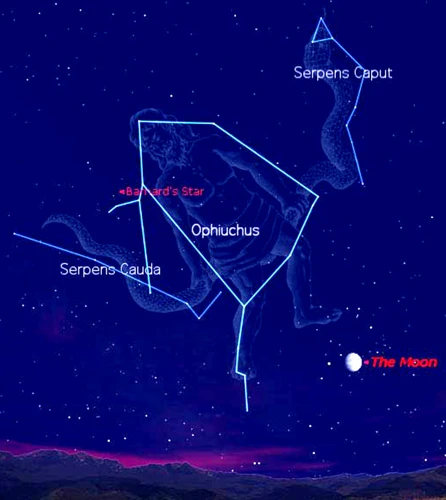
The Ophiuchus constellation, at times, has been regarded as a lost and forgotten member of the zodiac. This is mainly because the traditional zodiac system used in Western astrology consists of twelve signs, excluding Ophiuchus. However, it is important to note that Ophiuchus was recognized and included in earlier versions of the zodiac. The omission of Ophiuchus can be attributed to the development of astrology over time, where emphasis shifted towards twelve equal divisions of the ecliptic. Despite its exclusion, Ophiuchus has never truly disappeared from astronomy and has remained a part of celestial maps and charts. In recent years, there has been a resurgence of interest in Ophiuchus, with astrologers and enthusiasts delving deeper into its characteristics and exploring its influence on individual birth charts. This rediscovery of Ophiuchus has sparked intriguing discussions and debates within the astrological community, adding a fresh perspective to the established zodiac system. Ophiuchus’s status as a lost and rediscovered constellation serves as a reminder of the ever-evolving nature of astrology and the diverse cosmic influences that shape our lives.
Scientific and Astronomical Insights
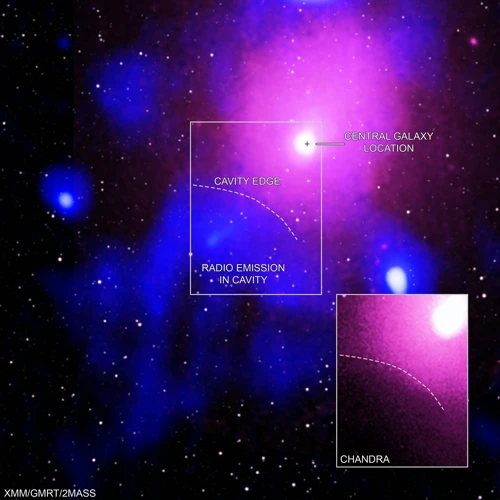
Scientific and astronomical research has shed light on the fascinating aspects of Ophiuchus. From an astronomical perspective, Ophiuchus is located along the celestial equator, making it visible from various parts of the world. It is positioned between the constellations of Scorpius and Sagittarius, and its prominent feature is the bright star Rasalhague, which represents the head of the Serpent Bearer. Ophiuchus is also home to several interesting deep-sky objects, including the Ophiuchus Cluster, a massive group of galaxies located approximately 390 million light-years away. Additionally, scientists have discovered several exoplanets in this constellation, some of which are located in the habitable zone of their respective star systems. These scientific insights not only enhance our understanding of the universe but also add to the allure and significance of Ophiuchus. Its celestial position and the celestial objects it encompasses make it a captivating area of study for astronomers and stargazers alike.
Modern Pop Culture Representation
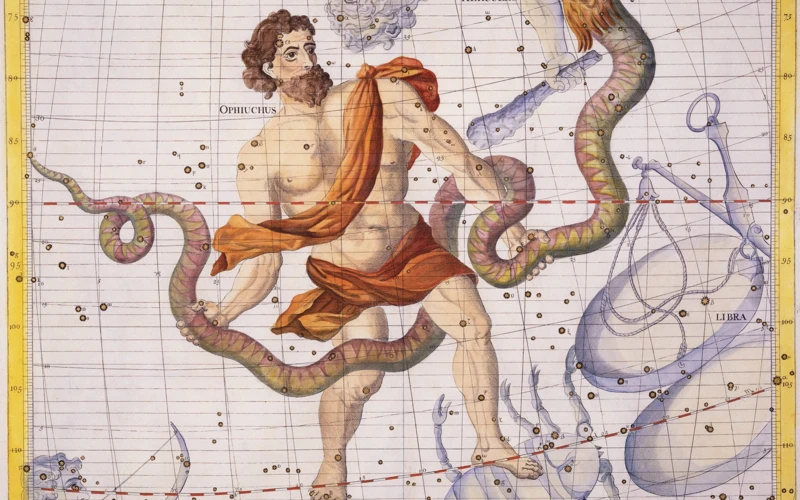
Ophiuchus, despite being a lesser-known zodiac sign, has made its mark in modern pop culture. It has gained recognition and representation in various forms of media, appealing to those with a fascination for astrology and mythology. In recent years, Ophiuchus has been incorporated into astrology-based websites and applications. Some astrologers have begun to include it as a thirteenth zodiac sign, bringing excitement and curiosity among astrology enthusiasts. Additionally, Ophiuchus has made appearances in books, movies, and television shows, often portrayed as a mysterious and powerful character with unique abilities. This representation has contributed to the growing interest in Ophiuchus and its mythology, attracting both loyal followers and newcomers alike. Whether it’s through astrology or popular culture, Ophiuchus continues to captivate the imagination, leaving a lasting impression on those who seek to uncover its secrets.
Controversies and Debate
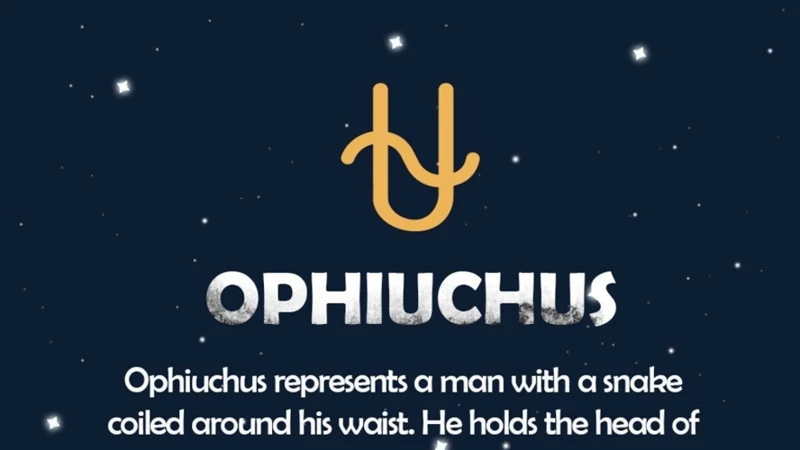
Controversies and debates surround Ophiuchus, particularly within the realm of astrology. One of the main points of contention is whether Ophiuchus should be included as a thirteenth zodiac sign, disrupting the traditional twelve sign system. This debate stems from the alignment of the zodiac constellations with the astrological signs. While some astrologers argue that Ophiuchus should be recognized as a valid sign due to its position in the sky and its influence on personality traits, others maintain that the twelve sign system should remain unchanged. Additionally, there is historical context surrounding the suppression of Ophiuchus, with theories that suggest it was deliberately omitted from popular astrological systems due to the difficulty of dividing the zodiac into equal parts. These controversies and debates highlight the dynamic nature of astrology and the ongoing exploration of Ophiuchus’ role within it.
Astrological Arguments
Astrological arguments surrounding Ophiuchus have sparked heated debates and discussions among astrologers and enthusiasts. One of the primary arguments revolves around the inclusion of Ophiuchus as a thirteenth zodiac sign, disrupting the traditional twelve-sign system. Proponents of including Ophiuchus argue that its presence completes the zodiac wheel and provides a more accurate representation of the celestial alignment at the time of birth. They believe that Ophiuchus possesses its own distinct set of characteristics and traits, which individuals born under this sign can identify with. They advocate for incorporating Ophiuchus into astrological readings, believing that it can provide deeper insights into personality, compatibility, and life patterns. Critics, on the other hand, argue that Ophiuchus cannot be considered a zodiac sign because it was not included in the ancient Babylonian astrological system from which the twelve-sign zodiac originated. They believe that including Ophiuchus would disrupt the historical and symbolic meanings associated with the traditional zodiac signs. This ongoing debate continues to fuel conversations and exploration of the role and significance of Ophiuchus within the realm of astrology.
Historical Context and Ophiuchus Suppression
The historical context surrounding Ophiuchus reveals a fascinating tale that involves its suppression and exclusion from traditional astrology. Ophiuchus’ absence from the twelve-sign zodiac system can be attributed to the ancient Greeks, who established their astrological framework around the four elements and the twelve zodiac signs we know today. The omission of Ophiuchus can be seen as a consequence of the Greeks’ preference for symmetry and the desire to simplify astrology into neat and manageable categories. Over the centuries, the dominance of the twelve-sign zodiac system became deeply entrenched, leading to the relegation of Ophiuchus to the sidelines. However, it is important to note that despite its exclusion in Western astrology, Ophiuchus has remained significant in different cultures around the world. This suppression underscores the way astrology has evolved and changed throughout history, and raises questions about the rigidity and inclusivity of astrological systems. Although it may have been overlooked in the past, Ophiuchus is now gaining recognition and reclaiming its place in modern astrology, sparking intriguing conversations and creating a more diverse and expansive understanding of the celestial realm.
Ophiuchus in Other Cultures
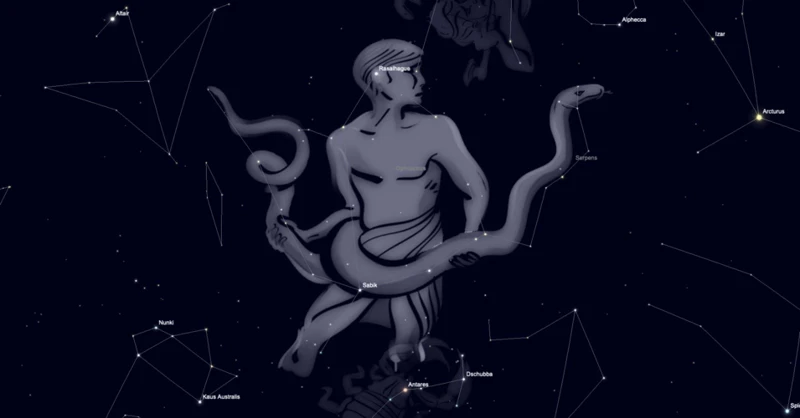
Ophiuchus, the Serpent Bearer, has a presence in various other cultures apart from ancient Greece. In Egyptian mythology, the constellation is associated with Imhotep, a high priest, physician, and architect during the Third Dynasty of Egypt. Imhotep, revered as a god of healing and wisdom, was often depicted holding a staff entwined by a serpent, similar to the symbol of Ophiuchus. The Babylonians also have a connection with this celestial figure, where Ophiuchus is associated with the god known as Ningishzida or Dumuzi. Ningishzida was considered a god of vegetation, fertility, and the underworld. It is fascinating to see how different cultures have embraced and attributed diverse meanings to the constellation of Ophiuchus, all connecting it with themes of healing, wisdom, and the mysteries of life and death. The presence of Ophiuchus in these cultures underscores its enduring significance and universal appeal, transcending geographical boundaries and reflecting the deep-rooted human fascination with the cosmos.
Conclusion
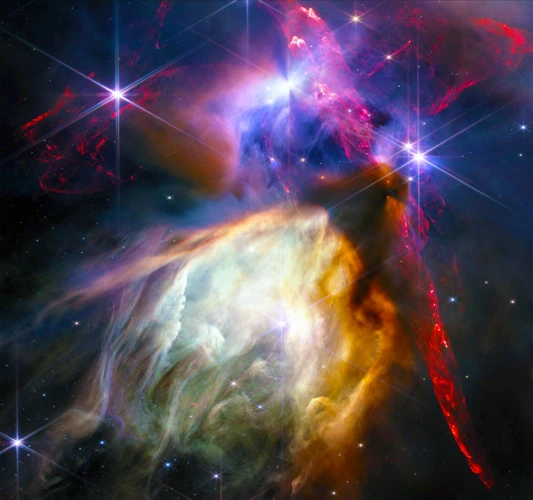
In conclusion, delving into the world of Ophiuchus has revealed a treasure trove of mythology, astrology, and historical significance. From its ancient Greek connection to the stories and symbols associated with it, Ophiuchus has fascinated cultures throughout the ages. The rediscovery of this lost constellation has provided us with scientific and astronomical insights, shedding light on the wonders of the universe. Ophiuchus has also made its mark in modern pop culture, further cementing its place in our collective consciousness. While debates and controversies surround its inclusion in the zodiac, the allure of Ophiuchus cannot be denied. Its unique traits and characteristics add depth and complexity to astrology. Moreover, its suppression and subsequent rediscovery highlight the challenges of preserving ancient knowledge. Ophiuchus has left an indelible mark on various cultures worldwide, with its influence extending beyond the Western zodiac. From mythology to astronomy, Ophiuchus continues to captivate and amaze, inviting us to explore its secrets and unravel the mysteries that lie within the stars.
Frequently Asked Questions
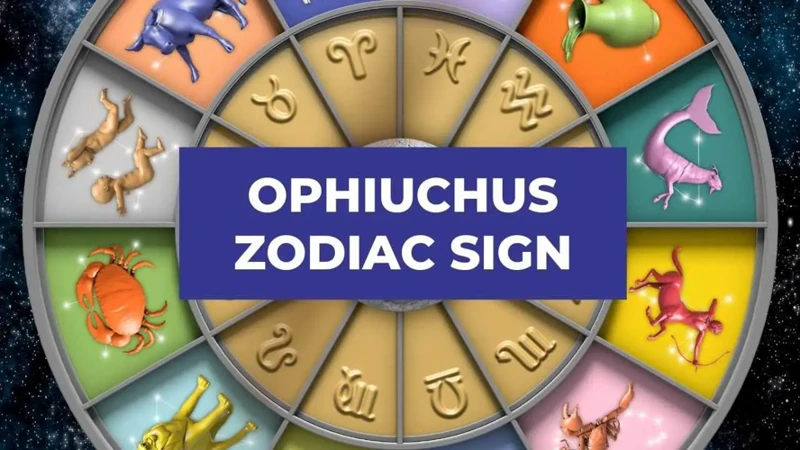
What does Ophiuchus represent in astrology?
Ophiuchus represents the Serpent Bearer and is the thirteenth zodiac sign that lies along the ecliptic. It is associated with qualities such as healing, wisdom, intuition, and transformation.
What are the astrological traits and characteristics of Ophiuchus?
Ophiuchus individuals are often described as passionate, brave, resourceful, and empathetic. They possess a natural inclination towards healing and have the ability to navigate complex emotions.
How does Ophiuchus compatibility work with other zodiac signs?
Ophiuchus compatibility can vary with each zodiac sign. Some signs that share similar traits and values, such as Cancer and Pisces, may have a harmonious relationship, while others may require more effort and understanding to achieve compatibility.
Are there any famous celebrities who fall under the Ophiuchus sign?
While Ophiuchus is not as commonly recognized as other zodiac signs, there are speculations about certain celebrities having Ophiuchus as their sun sign. However, it is important to note that the concept of Ophiuchus as a zodiac sign is not widely accepted in mainstream astrology.
What are some mythological tales and legends associated with Ophiuchus?
Ophiuchus is often associated with the Greek legend of Asclepius, the god of medicine and healing. His story, which includes his healing abilities and ultimate punishment by the gods, ties closely with the symbolism and significance of the constellation.
What are the key symbols associated with Ophiuchus?
The snake, representing renewal and healing, is the primary symbol associated with Ophiuchus. Additionally, the caduceus, a staff entwined by two snakes, is also frequently depicted as a symbol of medicine and healing.
Why was Ophiuchus considered a lost and rediscovered constellation?
Ophiuchus was originally included in the list of constellations recognized by the ancient Greeks and early astronomers. However, during the period when the twelve zodiac signs were established, Ophiuchus was omitted. It was later rediscovered and acknowledged as the thirteenth sign, creating debates and discussions within the astrological community.
Ophiuchus holds scientific significance as it is home to several notable celestial objects, including globular clusters and nebulae. Astronomical observations and studies of these objects provide valuable insights into the formation and evolution of stars and galaxies.
How is Ophiuchus portrayed in modern pop culture?
Ophiuchus has gained some recognition in modern pop culture, appearing in various forms of media such as literature, films, and artwork. It is often depicted as a powerful figure associated with healing and wisdom.
What are the controversies and debates surrounding Ophiuchus?
One of the main controversies surrounding Ophiuchus is its inclusion as a thirteenth zodiac sign. While some astronomers and astrologers argue for its recognition, others believe that it disrupts the established zodiac system and does not align with the traditional astrological framework.
References
Frequently Asked Questions

1. Is Ophiuchus considered an official zodiac sign?
No, Ophiuchus is not officially recognized as one of the 12 zodiac signs in Western astrology. However, it has gained popularity and sparked discussions among astrologers and enthusiasts.
2. What are the astrological traits of Ophiuchus?
Astrologers describe Ophiuchus individuals as intuitive, passionate, and determined. They are said to possess healing abilities, are drawn towards knowledge and enlightenment, and have a deep connection to the spiritual realm.
3. How does Ophiuchus affect compatibility with other zodiac signs?
Ophiuchus is believed to have unique compatibility with different zodiac signs. It is said to have a harmonious relationship with Cancer, Scorpio, and Pisces, while experiencing challenges with Aries, Libra, and Taurus.
4. What is the mythological connection of Ophiuchus?
According to Greek mythology, Ophiuchus represents Asclepius, the god of medicine and healing. Asclepius was known for his ability to bring the dead back to life, and his symbol, the Rod of Asclepius, is associated with modern-day medicine.
5. What are some notable stories and symbols associated with Ophiuchus?
Ophiuchus is often linked to the tale of Asclepius and his journey to gain the power of healing. The serpent, which plays a significant role in his story, is also a symbol associated with Ophiuchus.
6. Can you explain the lost and rediscovered constellation of Ophiuchus?
Ophiuchus was originally included as a constellation in ancient times but was later removed when the 12 zodiac signs were established. However, it has regained attention in recent years, prompting discussions about its significance and inclusion in astrology.
7. What do scientific and astronomical insights reveal about Ophiuchus?
Astronomically, Ophiuchus is a constellation located along the celestial equator. It houses numerous stars, including the famous red giant star, Rasalhague. Scientists study these celestial objects to understand more about the universe and its evolution.
8. How is Ophiuchus represented in modern pop culture?
Ophiuchus has made appearances in various forms of media, including movies, books, and artwork. It is often portrayed as a sagely figure, embodying wisdom and spiritual knowledge.
9. What are the controversies and debates surrounding Ophiuchus?
Astrologers have differing opinions about whether Ophiuchus should be included as a zodiac sign. Some argue that its inclusion would disrupt the existing zodiac system, while others believe it adds depth and complexity to astrology.
10. How does Ophiuchus appear in other cultures?
Ophiuchus has connections to other cultures as well. In Egyptian mythology, it is associated with the god Imhotep, who was known for his medical knowledge. In Mayan astrology, Ophiuchus is represented by a jaguar, symbolizing healing and spiritual transformation.
